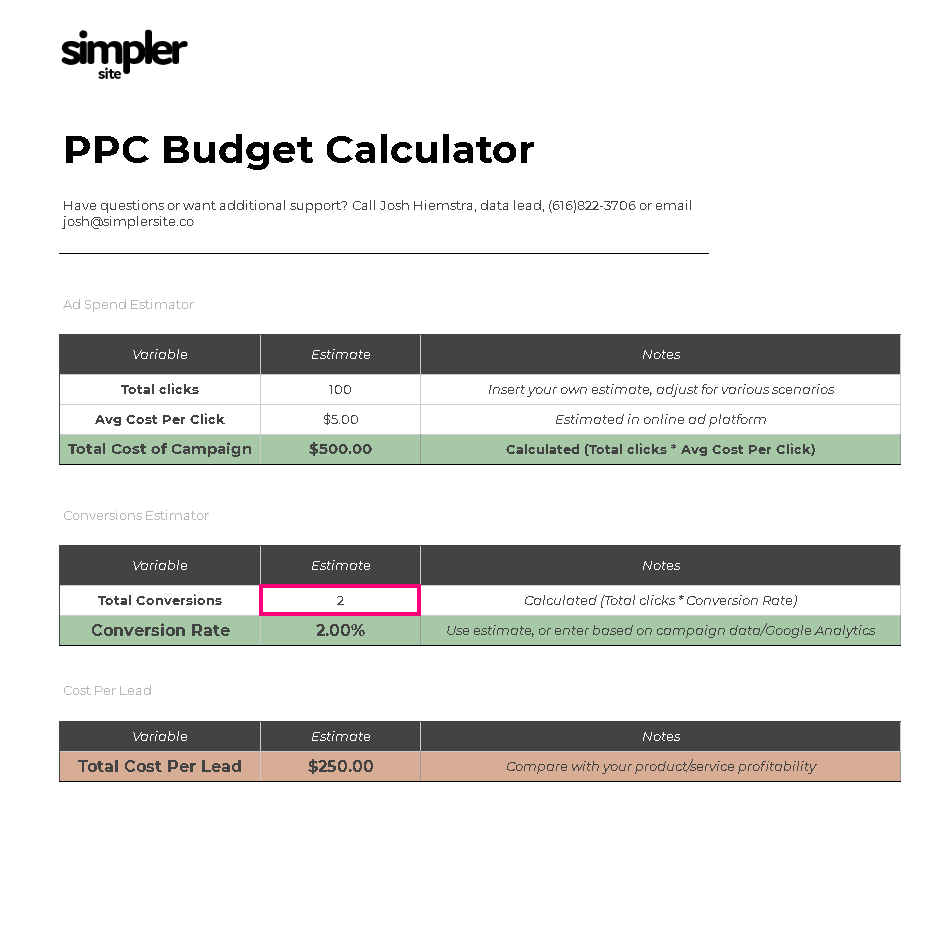If you’re thinking about implementing a Pay Per Click (PPC) campaign as part of your sales and marketing strategy, it’s important to determine if running PPC for your business will ultimately be profitable. We’ve created a spreadsheet calculator to support decision making as you estimate if online ad spend will be cost-effective.
The purpose of this calculator is to provide an estimated (not exact) ROI. Your margins will be affected by several variables, and the calculator is designed to easily adjust each field so you can forecast various scenarios.
Download PPC Budget Calculator
The following gives a brief description of each field used in the calculator. Variables for each field may be adjusted specifically for your company’s situation. If you would like help completing the calculator, contact Josh Hiemstra, data lead for Simpler Site, at (616)822-3706 or josh@simplersite.co.

Total Clicks: Total clicks equals the estimated ad clicks for the campaign being analyzed.
Avg Cost Per Click (CPC): The average cost per click is the amount you’re willing to bid for each online advertising campaign interaction. There are multiple interaction types you can choose to pay for on different platforms. For example, Google PPC has an option to pay per click. In this option, you bid for different keywords in different Google networks. You only pay when someone clicks on your ad.
Example – You received 10 clicks on your ad from Google PPC. The total cost for the 10 clicks was $15. So your average cost per click, $15/10, results in a $1.50 CPC.
For your calculation, there are different tools to use to get an estimated CPC. We use SEMRush to get estimated CPC values for our projects.
Total Cost of Campaign: The total cost of the online advertising campaign you are analyzing.
Total Conversions: Total conversions indicate next step success metrics when a user clicks from the ad to your website. A conversion will be different depending on your industry. For example, this could be a click to your contact page, click on your email/phone number, etc. Website analytics can provide a great baseline for this estimate.
Conversion Rate: The conversion rate is calculated by dividing your total leads by the total clicks for the campaign. There are multiple articles that review data and suggest a typical good conversion rate is between 2% – 5%.
Total Cost Per Lead: This field is calculated by dividing the total conversions by total cost of the campaign. The field should be used to compare to your cost for the product/service/etc that you are selling. Make sure that your campaigns are striving to be at a cost per lead that helps your business.
When using the tool, adjust numbers to help you understand what will fit your business needs when it comes to online advertising. We can help better understand the average cost per click as this will depend on the platform used (Google, Facebook, LinkedIn, etc.).
Need help determining your Cost Per Click?
Enter your email and we will follow up to help.